
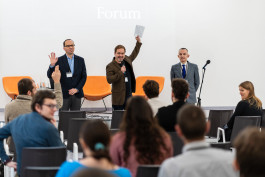
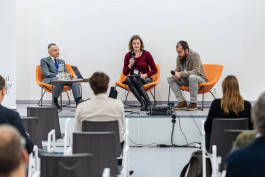
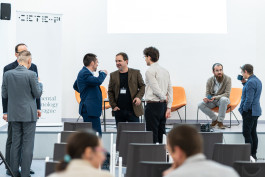
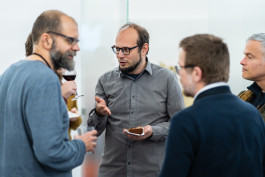
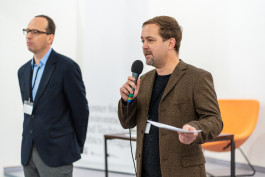
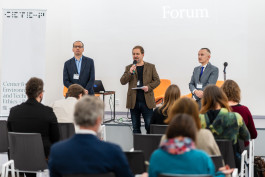
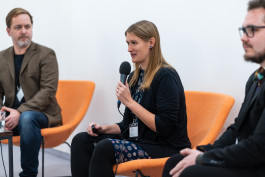
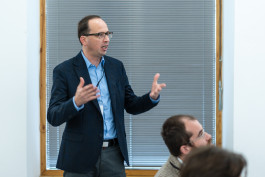
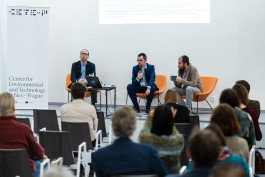
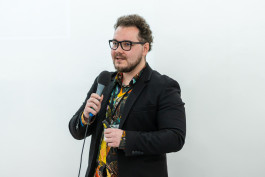
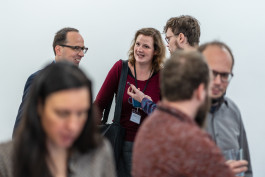
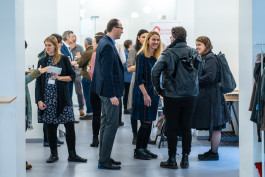
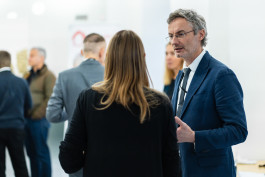
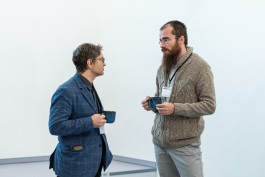
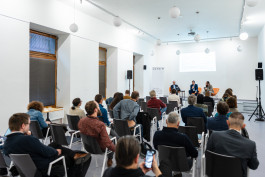
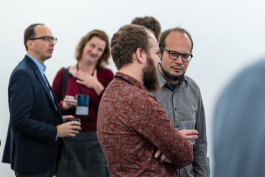
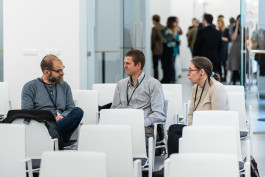

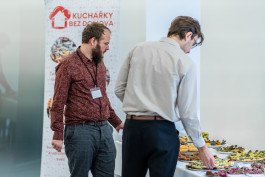

The CETE-P Forum program consisted of three segments, emphasizing subsequent discussions. In the first segment, focused on education, guests from NGOs Veronika Ambrozy (People in Need) and Martin Richter (Aignos) discussed their experiences in teaching about climate change and new technologies. They agreed that ethical questions play a crucial role in both domains, whether in terms of developing students' relationship with nature or fostering a responsible approach to technological tools like ChatGPT.
In the science-focused panel, experts Zuzana Harmáčková from CzechGlobe (Czech Academy of Sciences) and Jakub Mareček from the Artificial Intelligence Center (Czech Technical University in Prague) addressed the nexus between science, the environment, technology, and its ethical aspects. The exchange of knowledge has proven essential for enriching disciplines and searching for solutions to environmental or technological problems.
In the last segment devoted to public policies, Pavel Zámyslický director of the Energy and Climate Protection Department in the Ministry of the Environment of the Czech Republic presented practical measures concerning climate change solutions and their ethical dimension. According to Zámyslický, ethical questions emerge both at the local level concerning a just transition and in international UN negotiations, in which he actively participates. Ethical expertise is vital on both levels.
The CETE-P Forum provided a platform for discussions and interactions among invited speakers and guests from various sectors. The event highlighted the importance of expertise in ethics for questions related to sustainable development, new technologies, climate change, and emphasized the need for further developing connections between these sectors—a goal that future editions of the CETE-P Forum will pursue.
Full press release here
Photo: Romana Kovacsova

Free entry
The CETE-P Forum program consisted of three segments, emphasizing subsequent discussions. In the first segment, focused on education, guests from NGOs Veronika Ambrozy (People in Need) and Martin Richter (Aignos) discussed their experiences in teaching about climate change and new technologies. They agreed that ethical questions play a crucial role in both domains, whether in terms of developing students' relationship with nature or fostering a responsible approach to technological tools like ChatGPT.
In the science-focused panel, experts Zuzana Harmáčková from CzechGlobe (Czech Academy of Sciences) and Jakub Mareček from the Artificial Intelligence Center (Czech Technical University in Prague) addressed the nexus between science, the environment, technology, and its ethical aspects. The exchange of knowledge has proven essential for enriching disciplines and searching for solutions to environmental or technological problems.
In the last segment devoted to public policies, Pavel Zámyslický director of the Energy and Climate Protection Department in the Ministry of the Environment of the Czech Republic presented practical measures concerning climate change solutions and their ethical dimension. According to Zámyslický, ethical questions emerge both at the local level concerning a just transition and in international UN negotiations, in which he actively participates. Ethical expertise is vital on both levels.
The CETE-P Forum provided a platform for discussions and interactions among invited speakers and guests from various sectors. The event highlighted the importance of expertise in ethics for questions related to sustainable development, new technologies, climate change, and emphasized the need for further developing connections between these sectors—a goal that future editions of the CETE-P Forum will pursue.
Full press release here
Photo: Romana Kovacsova
Celetná 988/38
Prague 1
Czech Republic
This project receives funding from the Horizon EU Framework Programme under Grant Agreement No. 101086898. Views and opinions expressed are however those of the author(s) only and do not necessarily reflect those of the European Union or European Research Executive Agency (REA). Neither the European Union nor the granting authority can be held responsible for them.
Celetná 988/38
Prague 1
Czech Republic
This project receives funding from the Horizon EU Framework Programme under Grant Agreement No. 101086898. Views and opinions expressed are however those of the author(s) only and do not necessarily reflect those of the European Union or European Research Executive Agency (REA). Neither the European Union nor the granting authority can be held responsible for them.